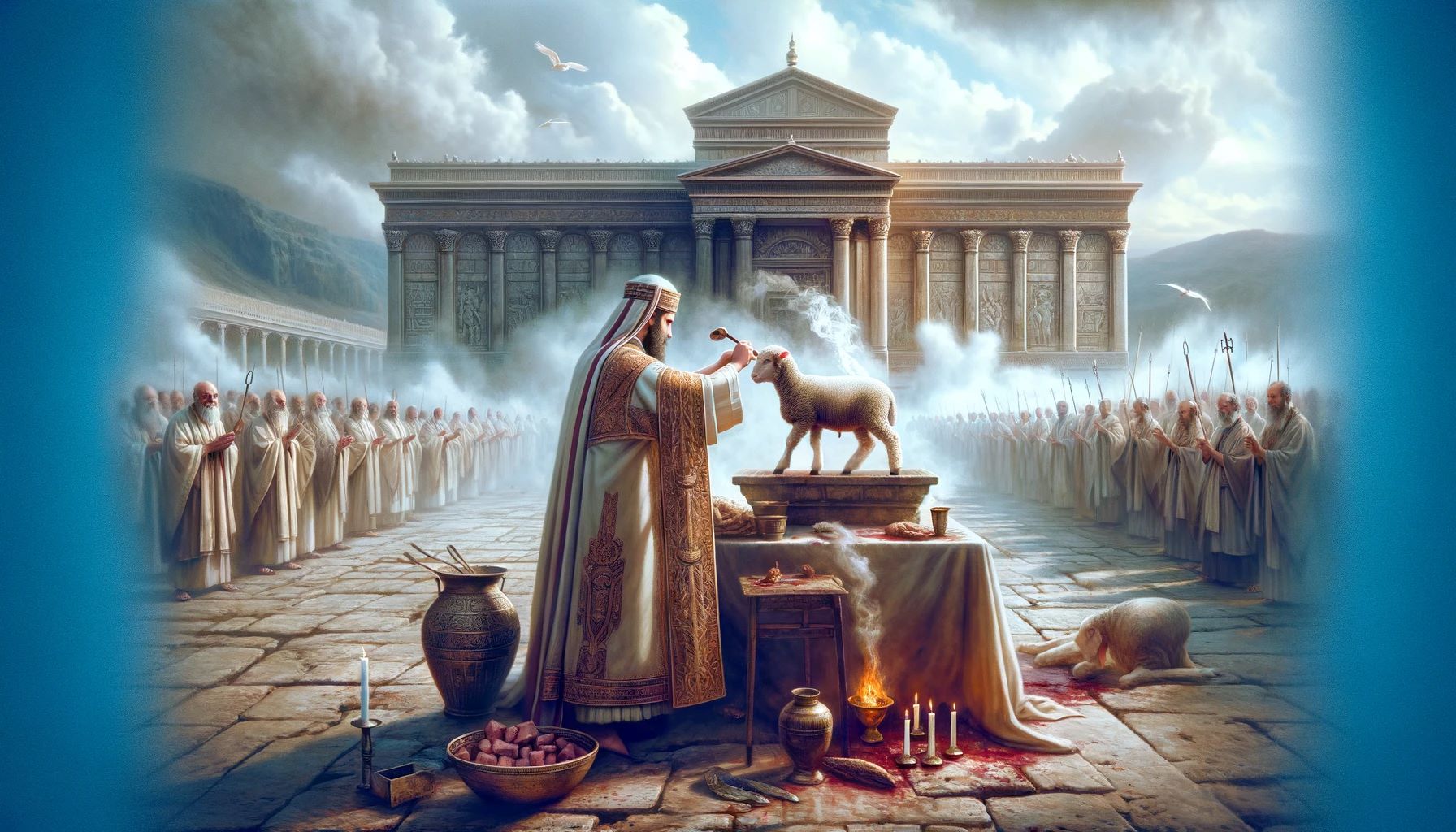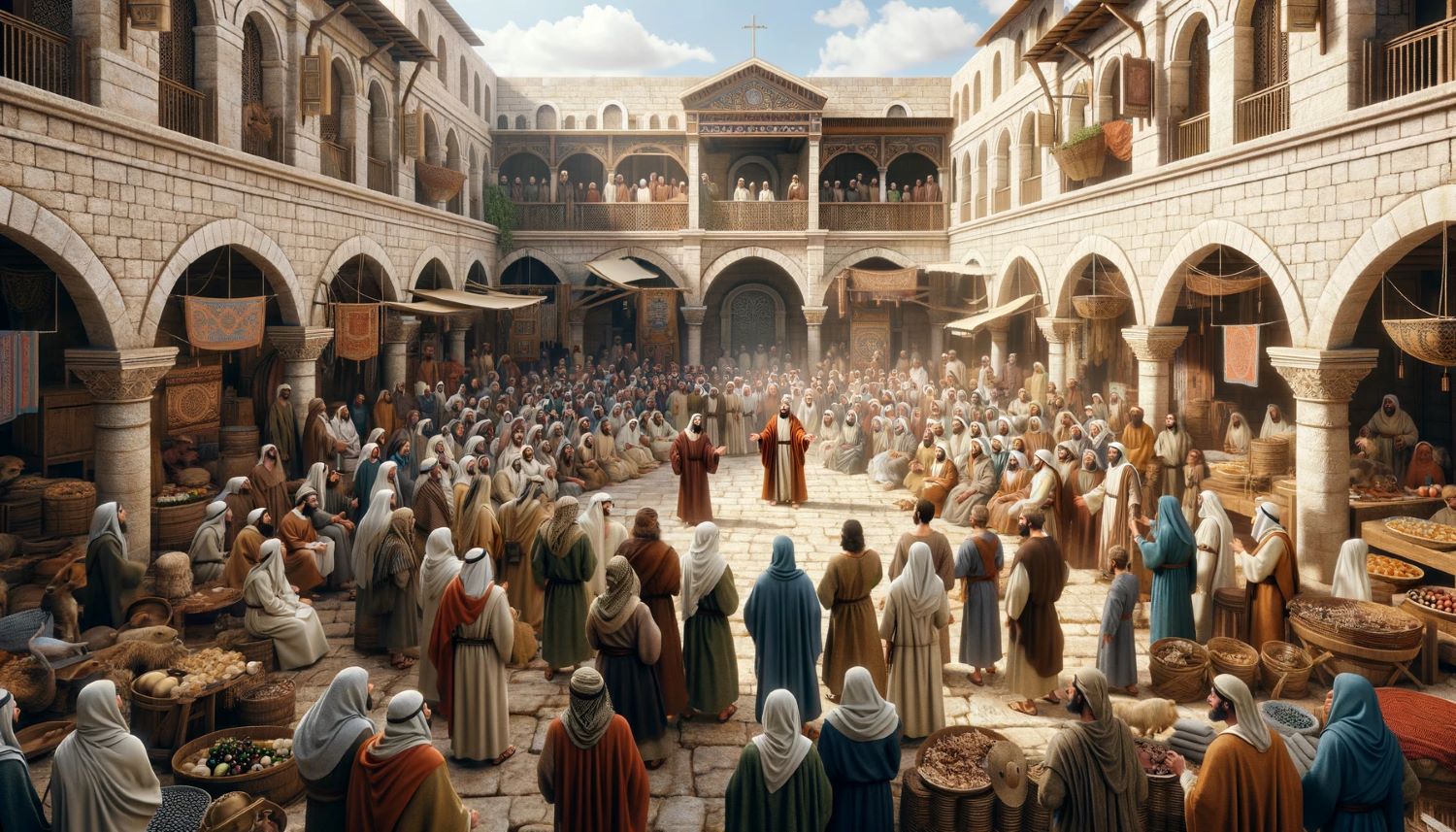Home>Christian Videos>Bible Stories>Where Does Jesus Quote The Old Testament In The Gospels


Bible Stories
Where Does Jesus Quote The Old Testament In The Gospels
Published: March 6, 2024
Ericka Andersen, an editor at Christian.net, expertly merges digital strategy with content creation, focusing on faith and societal issues. Her communication skills enhance the platform's engaging narratives, fostering meaningful dialogue on belief's impact on society.
Explore where Jesus quotes the Old Testament in the Gospels and delve into the significance of these references in the context of Bible stories. Uncover the connections and deepen your understanding.
(Many of the links in this article redirect to a specific reviewed product. Your purchase of these products through affiliate links helps to generate commission for Christian.net, at no extra cost. Learn more)
Table of Contents
Introduction
Where does Jesus quote the Old Testament in the Gospels? This question is a fundamental aspect of understanding the relationship between the Old Testament and the New Testament, as well as the significance of Jesus' teachings. In this article, we will explore the instances where Jesus quotes the Old Testament in the Gospels, and delve into the deeper meaning and implications of these quotations. Understanding the context and purpose of these references is crucial for gaining insight into the religious and historical significance of Jesus' teachings. Let's embark on this enlightening journey to uncover the profound connections between the Old Testament and the Gospels through the words of Jesus.
Read more: Where Is Jesus Christ In The Old Testament
Understanding the Old Testament in the Gospels
The Old Testament, also known as the Hebrew Bible, is a collection of sacred texts that hold immense significance in Judaism and Christianity. It comprises various books, including the Torah, Psalms, Prophets, and historical writings. In the context of the Gospels, which are the first four books of the New Testament, the Old Testament serves as a foundational framework for understanding Jesus' teachings and the fulfillment of prophecies. The Gospels, written by Matthew, Mark, Luke, and John, extensively reference the Old Testament, highlighting the continuity and fulfillment of divine promises and prophecies through the life and ministry of Jesus Christ.
The Old Testament as a Foundation
The Gospels frequently draw upon the Old Testament to establish the legitimacy of Jesus' identity as the long-awaited Messiah. The prophecies, symbols, and moral teachings found in the Old Testament provide a backdrop for understanding the significance of Jesus' life, death, and resurrection. By referencing the Old Testament, the Gospels emphasize the continuity between the Old and New Covenants, portraying Jesus as the fulfillment of ancient promises and the embodiment of divine wisdom and salvation.
Typology and Foreshadowing
Moreover, the Gospels employ typology, a literary device that establishes parallels between characters, events, and symbols in the Old Testament and their fulfillment in the New Testament. Through typological references, the Gospels illustrate how the narratives and figures in the Old Testament foreshadowed the coming of Jesus and the establishment of the Christian faith. This approach underscores the interconnectedness of the Old Testament and the Gospels, portraying them as integral components of a unified, redemptive narrative.
Moral and Spiritual Guidance
Additionally, the ethical and spiritual teachings found in the Old Testament serve as a moral compass and spiritual foundation for Jesus' ministry in the Gospels. His references to Old Testament commandments, wisdom literature, and prophetic utterances underscore the enduring relevance of these ancient texts in guiding the beliefs and practices of his followers. By integrating Old Testament principles into his teachings, Jesus reinforces the timeless truths and ethical imperatives encapsulated in the sacred scriptures of Judaism.
Understanding the Old Testament in the Gospels is essential for comprehending the theological, historical, and spiritual underpinnings of Jesus' message. The interplay between the Old Testament and the Gospels illuminates the profound continuity and fulfillment of divine promises, enriching the significance of Jesus' life and teachings for believers across generations.
Read more: Where Is Baptism In The Old Testament
Jesus' Quotations from the Old Testament in the Gospels
-
The Prophecy of Isaiah: In the Gospel of Matthew, Jesus quotes the prophecy of Isaiah, stating, "This people honors me with their lips, but their heart is far from me" (Matthew 15:8). This quotation from Isaiah 29:13 underscores Jesus' critique of religious hypocrisy and the importance of genuine devotion to God. By referencing this Old Testament prophecy, Jesus emphasizes the enduring relevance of Isaiah's message and its application to the spiritual condition of his contemporaries.
-
The Suffering Servant in Isaiah: Another significant quotation occurs in the Gospel of Matthew, where Jesus quotes the prophecy of Isaiah regarding the suffering servant: "He was numbered with the transgressors" (Matthew 27:38, Isaiah 53:12). This reference highlights the fulfillment of Isaiah's prophecy in Jesus' crucifixion, portraying him as the suffering servant whose redemptive sacrifice aligns with the divine purpose foretold in the Old Testament.
-
The Psalms and the Messiah: Throughout the Gospels, Jesus makes allusions to the Psalms, particularly in the context of Messianic prophecies. For instance, on the cross, Jesus quotes Psalm 22:1, exclaiming, "My God, my God, why have you forsaken me?" (Matthew 27:46). This poignant reference not only expresses Jesus' profound sense of abandonment but also establishes a connection between his suffering and the Messianic significance of Psalm 22.
-
The Law and Prophets: In the Sermon on the Mount, Jesus declares, "Do not think that I have come to abolish the Law or the Prophets; I have not come to abolish them but to fulfill them" (Matthew 5:17). This statement encapsulates Jesus' reverence for the Old Testament scriptures and his role as the fulfillment of their overarching purpose. By quoting the Law and the Prophets, Jesus reaffirms the continuity and fulfillment of divine revelation through his teachings and redemptive mission.
-
The Sign of Jonah: In the Gospel of Matthew, Jesus refers to the sign of Jonah, stating, "For just as Jonah was three days and three nights in the belly of the great fish, so will the Son of Man be three days and three nights in the heart of the earth" (Matthew 12:40). This allusion to the Old Testament narrative of Jonah serves as a prophetic foreshadowing of Jesus' death, burial, and resurrection, thereby establishing a profound connection between the Old Testament typology and the redemptive events of the Gospels.
Jesus' quotations from the Old Testament in the Gospels serve multiple purposes, including the validation of his Messianic identity, the fulfillment of prophetic promises, and the establishment of moral and theological continuity between the Old Testament and the New Testament. These references underscore the profound interconnectedness of divine revelation throughout salvation history, enriching the theological depth and spiritual significance of Jesus' teachings for believers.
The Significance of Jesus' Use of the Old Testament
Jesus' use of the Old Testament in the Gospels holds profound significance in elucidating the continuity, fulfillment, and transformative impact of divine revelation. His deliberate references to the Old Testament scriptures serve as a testament to the interconnectedness of the Old and New Covenants, affirming the enduring relevance of ancient prophecies, moral teachings, and redemptive promises. The significance of Jesus' use of the Old Testament can be delineated through several pivotal aspects:
1. Fulfillment of Prophecies
Jesus' quotations from the Old Testament in the Gospels underscore the fulfillment of Messianic prophecies and divine promises. By referencing the prophetic utterances of ancient seers such as Isaiah, David, and others, Jesus establishes a direct link between the Old Testament anticipation of the Messiah and his own identity as the fulfillment of these prophetic expectations. This fulfillment not only validates Jesus' Messianic role but also exemplifies the harmonious continuity between the Old Testament prophecies and their realization in the person and mission of Jesus Christ.
2. Moral and Spiritual Continuity
Moreover, Jesus' use of the Old Testament reinforces the moral and spiritual continuity between the Old and New Testaments. His references to the ethical precepts, wisdom literature, and prophetic admonitions of the Old Testament highlight the enduring relevance of these teachings in guiding the beliefs and practices of his followers. By integrating Old Testament principles into his teachings, Jesus emphasizes the timeless truths and ethical imperatives encapsulated in the sacred scriptures of Judaism, thereby fostering a seamless transition from the Old Testament ethos to the ethical framework of the Christian faith.
3. Typological Connections
Furthermore, Jesus' use of the Old Testament illuminates typological connections between the narratives, symbols, and figures of the Old Testament and their fulfillment in the New Testament. Through typological references, Jesus demonstrates how the events, characters, and rituals of the Old Testament foreshadowed the redemptive work and salvific significance of his own ministry. This typological continuity not only enriches the theological depth of Jesus' teachings but also underscores the interconnectedness of divine revelation across the Old and New Testaments, portraying them as integral components of a unified, redemptive narrative.
4. Divine Authority and Revelation
By quoting the Old Testament scriptures, Jesus asserts the divine authority and revelatory nature of the sacred texts. His use of the Old Testament serves to validate the authenticity and divine inspiration of the ancient scriptures, thereby reinforcing their significance as a foundational framework for understanding God's redemptive plan and moral guidance. Through his quotations, Jesus affirms the enduring relevance and authority of the Old Testament, thereby emphasizing its indispensable role in shaping the beliefs and practices of his followers.
In essence, the significance of Jesus' use of the Old Testament in the Gospels lies in its multifaceted role in affirming the fulfillment of prophecies, establishing moral and spiritual continuity, illuminating typological connections, and affirming the divine authority and revelatory nature of the Old Testament scriptures. These aspects collectively enrich the theological depth and spiritual significance of Jesus' teachings, underscoring the profound interconnectedness of divine revelation throughout salvation history.
Conclusion
In conclusion, the instances where Jesus quotes the Old Testament in the Gospels are pivotal for understanding the profound connections between the Old Testament and the Gospels. Jesus' deliberate references to the Old Testament scriptures serve to validate his Messianic identity, affirm the fulfillment of ancient prophecies, and establish moral and theological continuity between the Old and New Testaments. By drawing upon the rich tapestry of the Old Testament, Jesus illuminates the enduring relevance and transformative impact of divine revelation, thereby enriching the theological depth and spiritual significance of his teachings for believers across generations. The interplay between the Old Testament and the Gospels underscores the harmonious continuity and fulfillment of divine promises, portraying Jesus as the culmination of ancient prophecies and the embodiment of God's redemptive plan. Ultimately, the quotations of the Old Testament by Jesus in the Gospels serve as a testament to the timeless truths, prophetic fulfillment, and moral guidance encapsulated in the sacred scriptures, thereby fostering a profound appreciation for the interconnectedness of divine revelation throughout salvation history.













